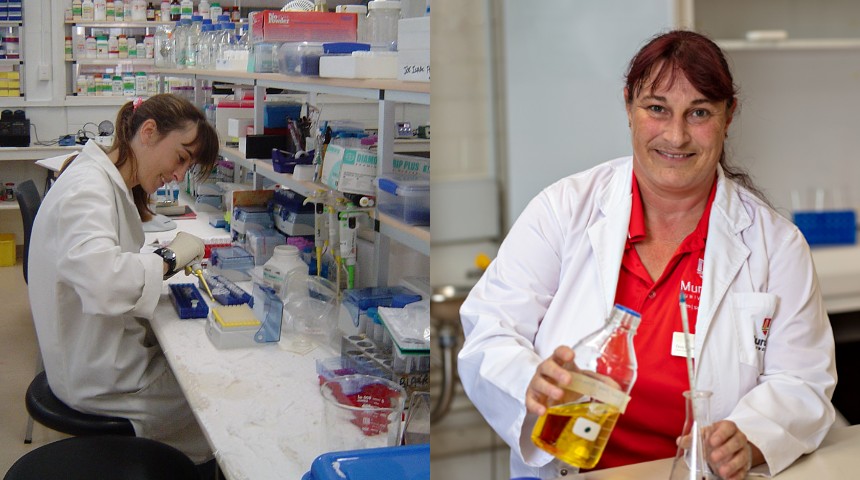
Friday, 11 February marks International Day of Women and Girls in Science – an initiative by the United Nations to recognise the remarkable women who are changing the world through science.
It’s an important day that seeks to encourage girls to consider science subjects, and recognises the role women and girls play as agents of change in the past, present and future.
Both Dr Grey Coupland, Research Fellow at Murdoch’s Harry Butler Institute, and Dr Cindy Palermo, Research Assistant at the Harry Bulter Institute, inspire young girls with the wonders of science every day through outreach programs across WA primary schools.
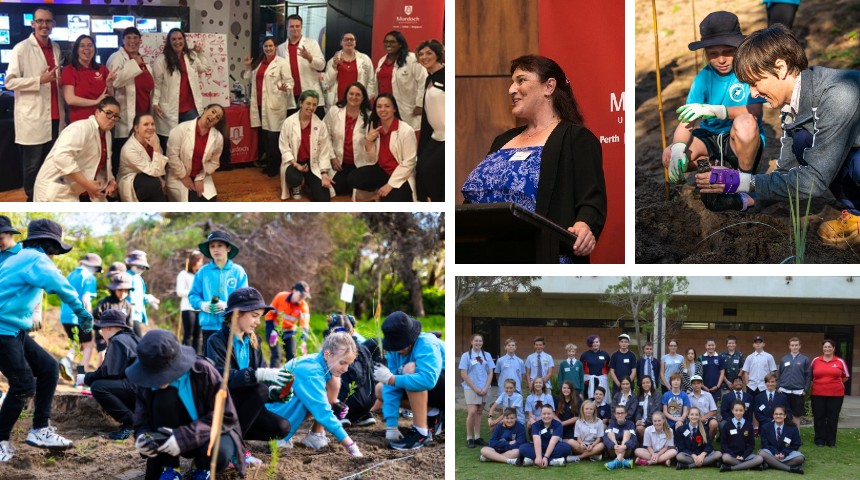
Dr Palermo and Dr Coupland working with school children through a variety of outreach programs.
About the outreach programs
Murdoch has a range of outreach programs to get young students across primary school and high school excited about learning, provide experiences across a range of subjects and, particularly for young adults, showcase the many pathways they can take into university.
The Outreach and Future Student teams consist of wonderful Student Ambassadors supported by experienced staff, who visit high schools in WA to tell them about their journey through high school into university. The Student Ambassadors deliver workshops to high schoolers, which include hands-on activities to showcase their course, but also what their career will look like. They also attend many events like career expos, Murdoch Open Day, Information Evenings and STEMM Days, inspiring many students, teachers and parents through highly interactive presentations and activities.
An unique aspect of Dr Coupland and Dr Palermo’s outreach programs is their work with both primary school and high schools. Reaching out to students from an early age through to their teens, showing them first-hand the difference they can make towards a positive future.
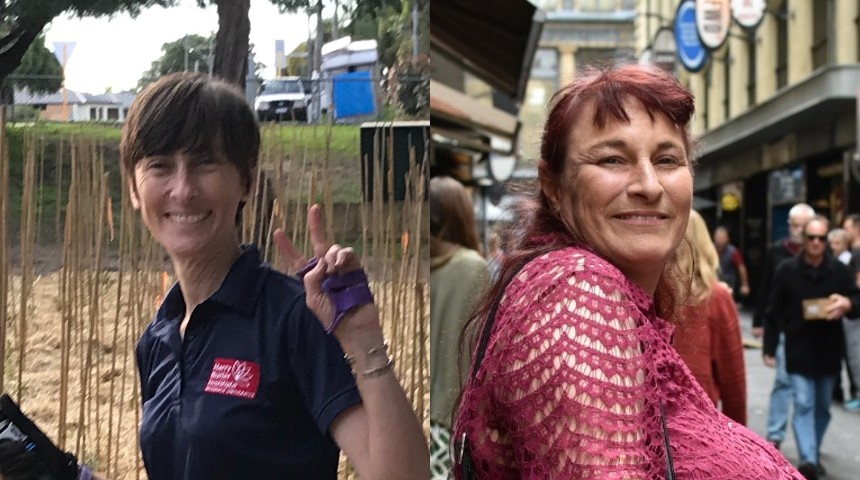
Dr Coupland (left) and Dr Palermo (right).
School outreach stories
Working with children and having the opportunity to inspire the next generation of scientists and ecowarriors is Dr Coupland and Dr Palermo's favourite part of their job.
Dr Coupland is currently working on a primary school outreach program and dedicated science research project that is investigating the use of the Miyawaki method to restore natural vegetation in urban areas of Australia.
“I bring these special forests into schools for children to plant and study, and I conduct my own research right alongside the students,” she said.
“The Miyawaki forest outreach program brings nature into schools with the children planting their very own tiny forest. It enables children to see first-hand that their actions can make a positive difference to the environment as they watch their forests grow and biodiversity that their forest attracts. “
“I think giving children practical interaction with nature is vital as children can feel disempowered and worried about climate change and the biodiversity crisis," she said.
Reflecting on her presentations, Dr Coupland remembered the enthusiasm of two girls in a year four class at South Padbury Primary School.
“It was the first lesson I had had with the class, and I was telling them all about Miyawaki forests, how amazing these forests are and what they might expect from their forest,” she said.
“I like the children to ask me questions whenever the thought occurs to them, so that they don’t forget to ask.
“The questions that popped out of the mouths of the two girls were nothing to do with their forest or the monitoring, but were about how to become a scientist, what I studied as an undergraduate, how long it had taken me and what research I had done.
It was a really exciting moment for me when I thought these two girls might travel the science path, and that standing in front of them talking about what I do might help them a little way along that path.”Dr Grey Coupland, Murdoch University
Dr Palermo used to facilitate an after-school science program for Years 8 and 9 called BrightSparx run by the Kwinana Industry Council.
“Part of the program included a tour of Wesfarmers Chemicals, Energy & Fertilisers and Murdoch University. At the beginning of the bus trip most students were explaining that they would probably not go to university, as they thought they were not capable. On the bus trip back, they were all discussing what they would like to study at Murdoch,” she said.
"In one day, they had been inspired and their lives had changed. I believe anyone is capable of anything if they are passionate and this is what I told the students.”
Another highlight for Dr Palermo was watching a student graduating university after she first met them working as a Student Ambassador.
“I met a student through the Student Ambassador program when she was in Year 10. I met up with her again the following year in Year 11 when I conducted outreach workshops,” she said.
“The student wanted to study Veterinary Science and in her first year at Murdoch, I was her first-year student mentor and helped her with studying techniques.
“I was teaching in her laboratory class for first-year Cell Biology unit and was able to maintain contact and support throughout her studies,” she said.
“In 2021, I had the privilege of watching her graduate from Veterinary Science. It was such a joy knowing that I may have played a small part in her journey.”
What would you say to young girls to encourage them to consider studying science?
“My words of advice to girls, if science is your dream, believe in yourself, and don’t let anything or anyone hold you back,” Dr Coupland said.
“And don’t be put off thinking that science is too difficult. It really isn’t, because if you are passionate about science, it inspires you to work hard, and to find the right questions.
“The key thing to remember is that science is not about boys and not about girls, there is no gender. Science is about questioning, looking at things from a new perspective and working with interesting people who challenge you.”
“Anything is possible when you are passionate. I am a single mother and have been for a while, if I can achieve my dreams so can you,” Dr Palermo said.
“Explore the different areas of science by attending workshops and open days, you will be pleasantly surprised.”
There is something for everyone and you can change the role of women in science. The resources and support are available, and anyone can achieve their dreams.” Dr Cindy Palermo, Murdoch University
About Dr Coupland and Dr Palermo
Both Dr Coupland and Dr Palermo have been fascinated by science ever since they were young, reading many books and learning the wonders of science.
“I grew up on a diet of Harry Butler, the Leyland Brothers and my hero and inspiration, David Attenborough. Watching their programs and reading loads of nature books I borrowed from the library kept me motivated and led me to study biology in high school,” Dr Coupland said.
“I have always been interested in science ever since I could read the Childcraft Encyclopaedia Library when I was four years old. I would spend hours each day reading the books and exploring the possibilities of science,” Dr Palermo said.
Their journeys through to their current role at the Harry Butler Institute has been exciting, eye opening and full of many accomplishments.
“So many opportunities have been given to me at Murdoch University. Too numerous to mention all of them but there have been a few highlights,” Dr Palermo said.
“I have also received three scholarships from the University, including a research living stipend of $30,000 for my PhD, looking into parasites and diseases in feral fish.”
“I received an award for services in Veterinary and Life Sciences school as well. I volunteer wherever I can, as Murdoch helped me with my life, and this did not go unnoticed,” she said.
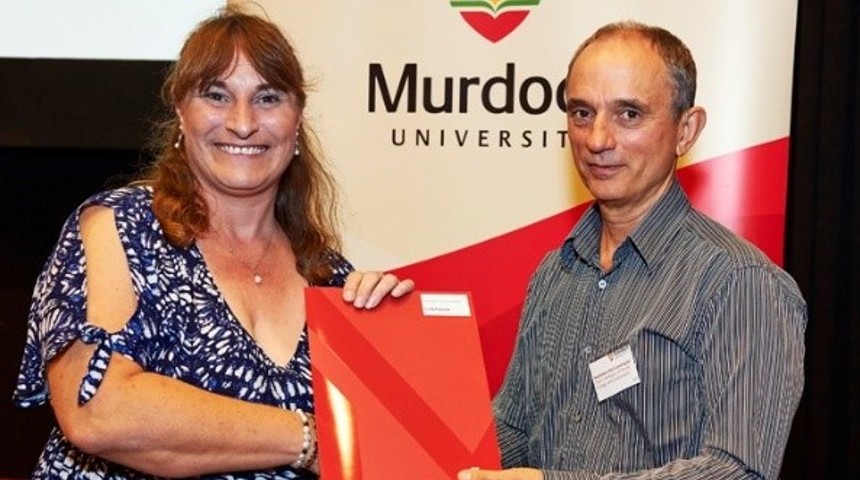
Dr Palermo receiving PhD scholarship.
“After completing my Honours degree, I was fortunate to be awarded an Australian Postgraduate Award that allowed me to undertake my PhD,” Dr Coupland said.
“I chose to study mangrove ecology, as mangroves are so fascinating, situated on the cusp between the land and the sea. They are such vital habitats for biodiversity.”
During her PhD, Grey was awarded a conference travel grant to attend a mangrove ecology conference in Kenya, which was her first international conference.
“The trip to Kenya was incredible. I had never been to Africa before, so everything was new and interesting. At the conference I met mangrove ecologists and biologists from around the world. There was huge diversity in the research presented and talking to others in the same field was so energising,” she said.
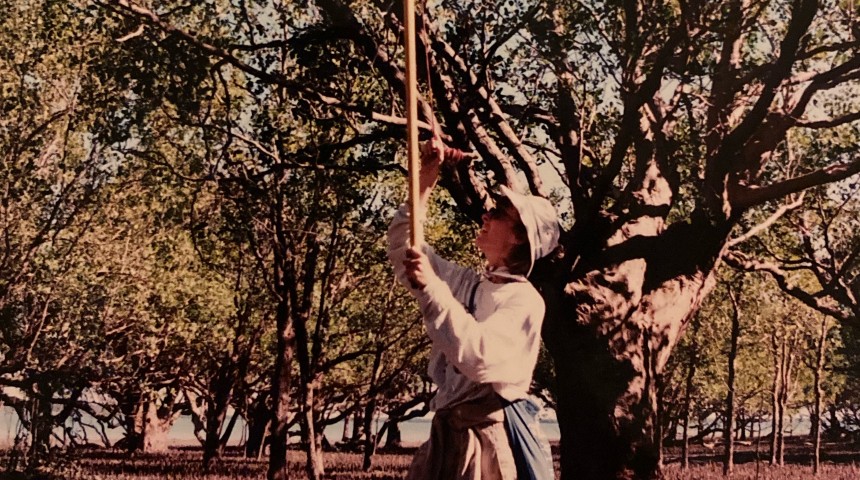
Mangrove field work featuring Dr Coupland.